2021届高考英语二轮复习精品课件:模块1 专题3 语法考点大突破 第3讲 形容词和副词 (共 48张ppt)
文档属性
| 名称 | 2021届高考英语二轮复习精品课件:模块1 专题3 语法考点大突破 第3讲 形容词和副词 (共 48张ppt) | 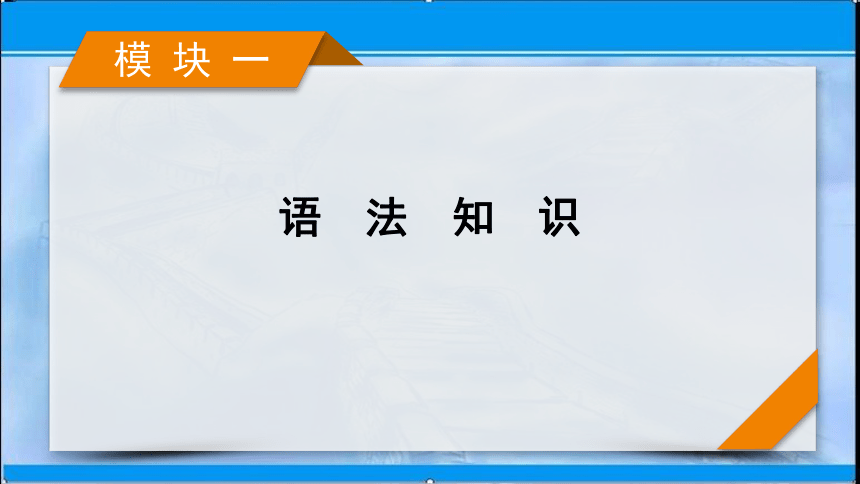 | |
| 格式 | ppt | ||
| 文件大小 | 1.9MB | ||
| 资源类型 | 教案 | ||
| 版本资源 | 通用版 | ||
| 科目 | 英语 | ||
| 更新时间 | 2021-02-04 16:32:26 | ||
图片预览

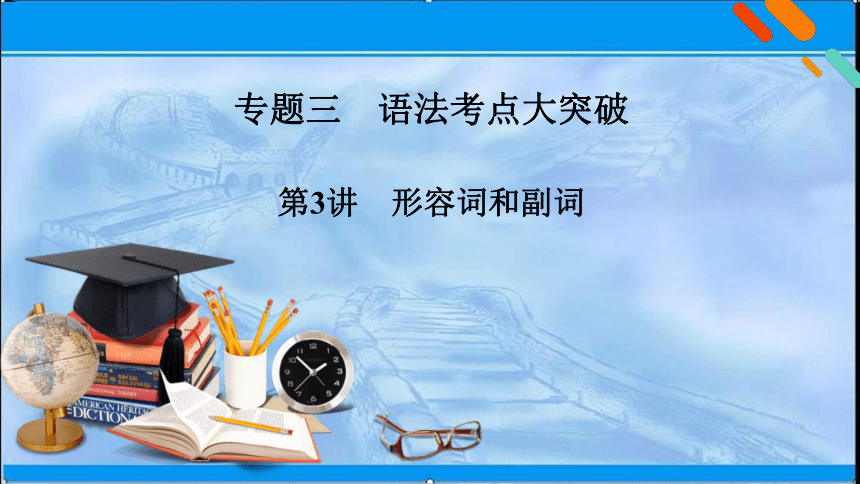
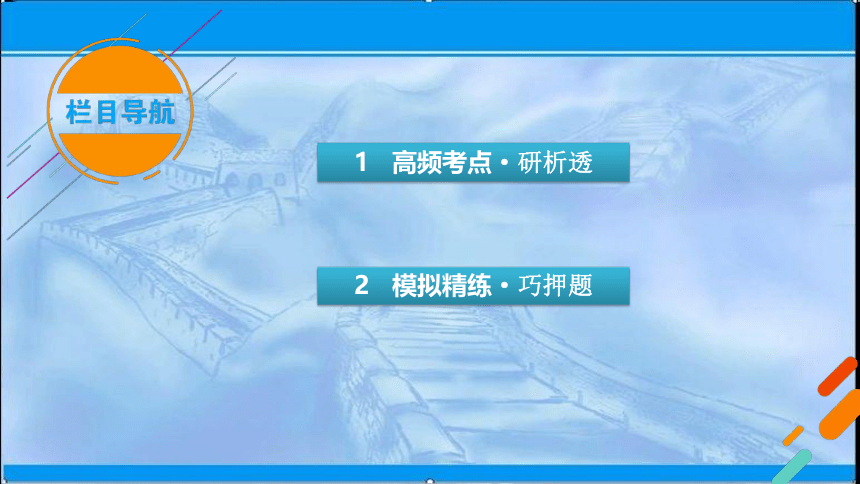

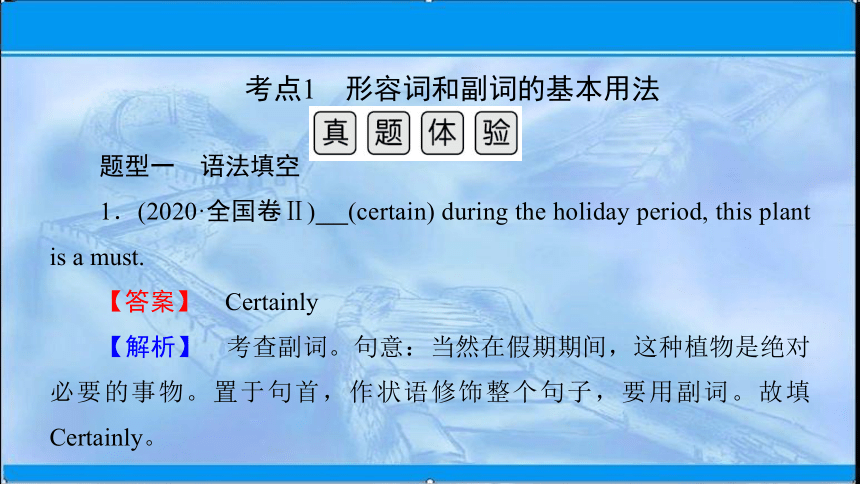
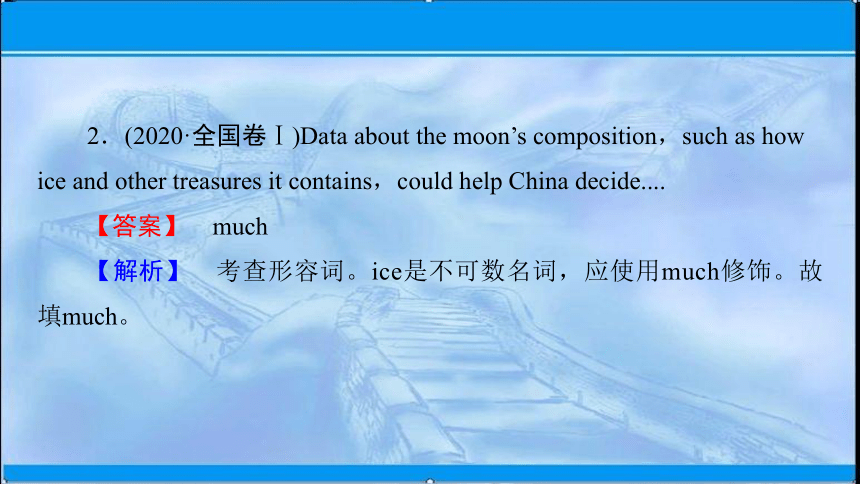
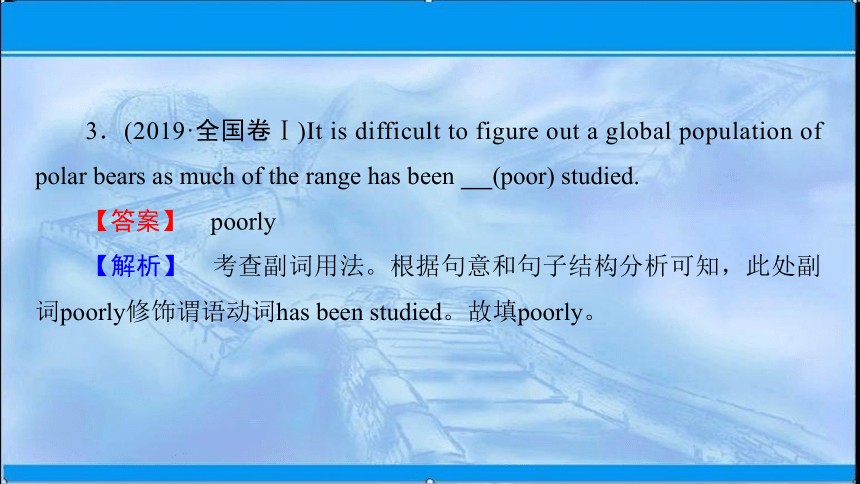
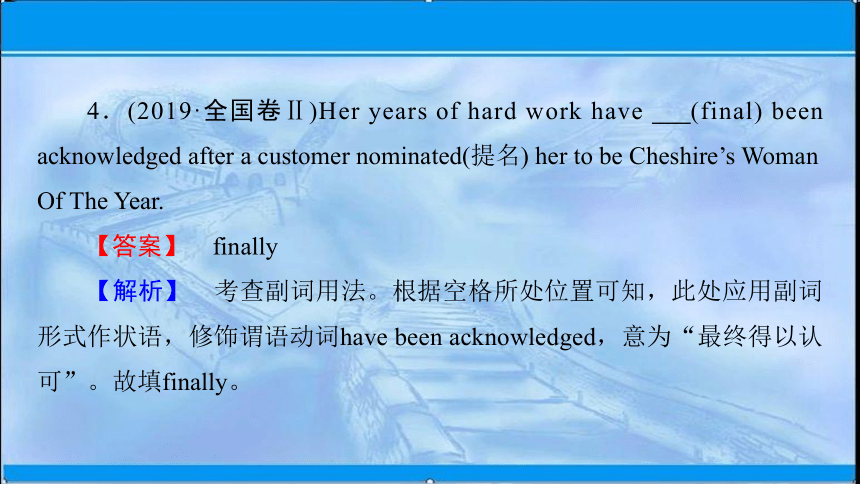
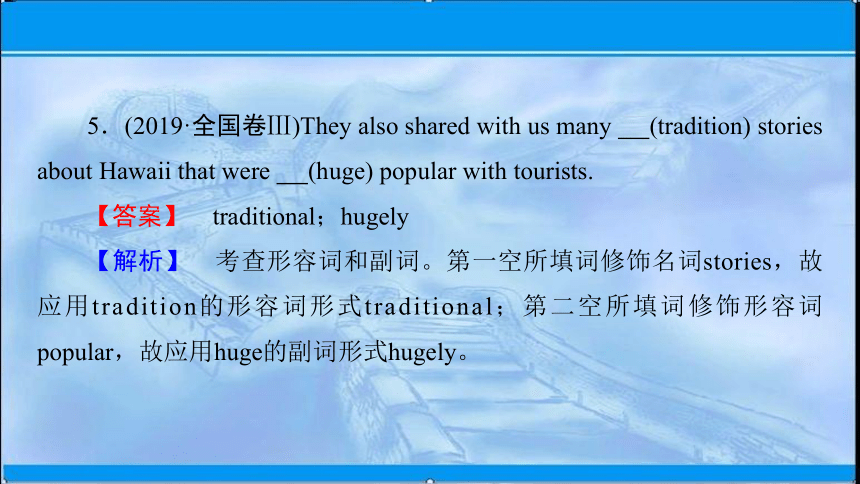
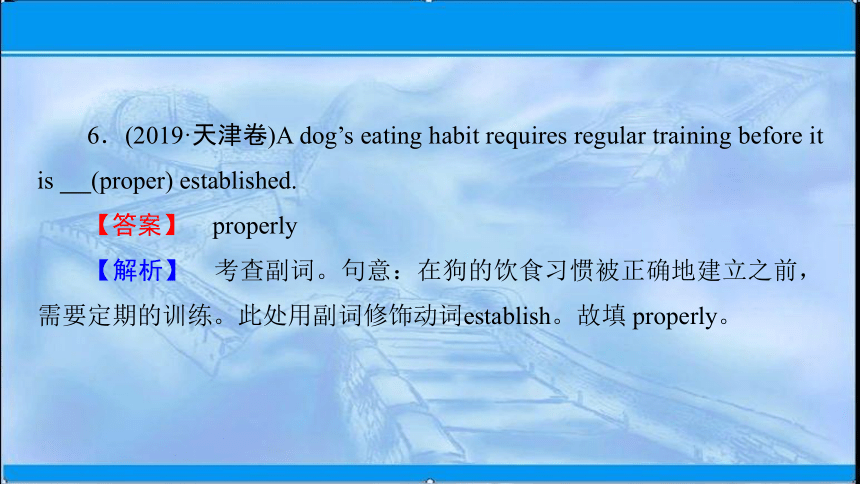
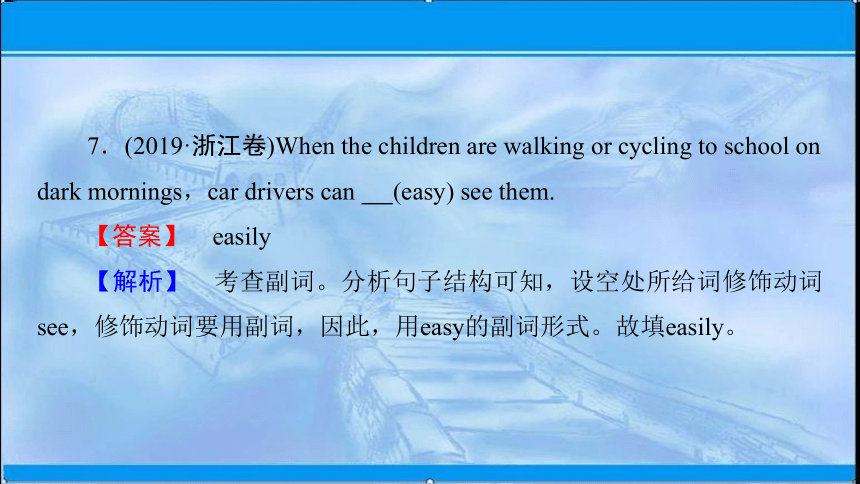
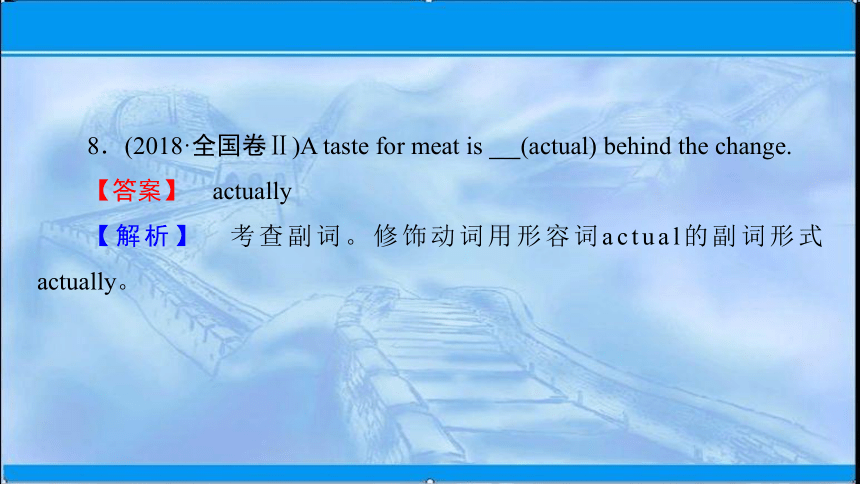
文档简介
模 块 一
语 法 知 识
专题三 语法考点大突破
第3讲 形容词和副词
1 高频考点·研析透
2 模拟精练·巧押题
高频考点·研析透
考点1 形容词和副词的基本用法
题型一 语法填空
1.(2020·全国卷Ⅱ) (certain) during the holiday period, this plant is a must.
【答案】 Certainly
【解析】 考查副词。句意:当然在假期期间,这种植物是绝对必要的事物。置于句首,作状语修饰整个句子,要用副词。故填Certainly。
2.(2020·全国卷Ⅰ)Data about the moon’s composition,such as how ice and other treasures it contains,could help China decide....
【答案】 much
【解析】 考查形容词。ice是不可数名词,应使用much修饰。故填much。
3.(2019·全国卷Ⅰ)It is difficult to figure out a global population of polar bears as much of the range has been (poor) studied.
【答案】 poorly
【解析】 考查副词用法。根据句意和句子结构分析可知,此处副词poorly修饰谓语动词has been studied。故填poorly。
4.(2019·全国卷Ⅱ)Her years of hard work have (final) been acknowledged after a customer nominated(提名) her to be Cheshire’s Woman Of The Year.
【答案】 finally
【解析】 考查副词用法。根据空格所处位置可知,此处应用副词形式作状语,修饰谓语动词have been acknowledged,意为“最终得以认可”。故填finally。
5.(2019·全国卷Ⅲ)They also shared with us many (tradition) stories about Hawaii that were (huge) popular with tourists.
【答案】 traditional;hugely
【解析】 考查形容词和副词。第一空所填词修饰名词stories,故应用tradition的形容词形式traditional;第二空所填词修饰形容词popular,故应用huge的副词形式hugely。
6.(2019·天津卷)A dog’s eating habit requires regular training before it is (proper) established.
【答案】 properly
【解析】 考查副词。句意:在狗的饮食习惯被正确地建立之前,需要定期的训练。此处用副词修饰动词establish。故填 properly。
7.(2019·浙江卷)When the children are walking or cycling to school on dark mornings,car drivers can (easy) see them.
【答案】 easily
【解析】 考查副词。分析句子结构可知,设空处所给词修饰动词see,修饰动词要用副词,因此,用easy的副词形式。故填easily。
8.(2018·全国卷Ⅱ)A taste for meat is (actual) behind the change.
【答案】 actually
【解析】 考查副词。修饰动词用形容词actual的副词形式actually。
题型二 单句改错
1.(2020·全国卷Ⅰ)Today I tried cooking a simply dish myself.
【答案】 simply→ simple
【解析】 考查形容词。根据名词dish可知,此处应用形容词作定语。故将simply改为simple。
2.(2019·全国卷Ⅱ)First,I wanted to be a fireman,whose uniform looked so coolly.
【答案】 coolly→cool
【解析】 考查形容词的用法。句中的“looked(看起来……样)”为系动词,系动词后需用形容词作表语。故将coolly改为cool。
3.(2019·全国卷Ⅲ)What I want is not just an ordinarily cafe but a very special one.
【答案】 ordinarily→ordinary
【解析】 考查形容词的用法。修饰名词cafe,应用形容词。ordinarily 是副词。故把 ordinarily改为 ordinary。
4.(2018·全国卷Ⅲ)I was afraid to speak in front of a larger group of people.
【答案】 larger→large
【解析】 考查形容词。根据语意判断此处并无比较意义,应用形容词的原级。
5.(2018·全国卷Ⅰ)I felt happily that their life had improved.
【答案】 happily→happy
【解析】 考查形容词作表语。句意为:他们的生活得到了改善,我感到很高兴。feel为系动词,应该用形容词作表语。故将happily改为happy。
6.(2018·全国卷Ⅲ)Immediate,I raised my hand.
【答案】 Immediate→Immediately
【解析】 考查副词的用法。放于句首,作状语修饰整个句子,要用副词。故将Immediate改为Immediately。
1.形容词主要用来修饰名词和代词,作定语或表语。
2.副词主要用来修饰动词、形容词、副词、介词短语或整个句子,作状语。
3.系动词之后要用形容词作表语,不能用副词。
4.注意形容词变副词的规律。
(1)一般情况:直接加ly
quick→quickly
brave→bravely
immediate→immediately
(2)大多数“辅音字母+e”结尾的形容词直接加ly
unfortunate→unfortunately
absolute→absolutely
attractive→attractively
(3)“辅音字母+y”结尾的形容词要变y为i再加ly
happy→happily
heavy→heavily
steady→steadily
(4)以al结尾的形容词,变副词直接加ly
typical→typically
eventual→eventually
occasional→occasionally
normal→normally
gradual→gradually
(5)“辅音字母+le”结尾的形容词,去e加y
simple→simply
gentle→gently
comfortable→comfortably
possible→possibly
reasonable→reasonably
probable→probably
(6)特殊 true→truly
(7)以-ll结尾只加y
full→fully dull→dully
(8)以-ic结尾加ally
basic→basically
scientific→scientifically
automatic→automatically
(9)特别注意
whole→wholly
shy→shyly
dry→dryly
good→well
5.动词、名词变形容词的常见后缀
(1)-al 如music(al),origin(al),person(al),form(al),nation(al),centre(central),nature(natural)
(2)-ful 如hope(ful),harm(ful),help(ful),peace(ful),care(ful),use(ful)
(3)-able 如accept(able),comfort(able),fashion(able),suit(able),reason(able)
(4)-ible 如access(ible),horror(horrible),terror(terrible)
(5)-ive 如act(ive),effect(ive),attract(ive),impress(ive),instruct(ive),expense(expensive)
(6)-ous 如continue(continuous),anxiety(anxious),caution(cautious),curiosity(curious),humor(humorous)
(7)-y 如health(y),wealth(y),dirt(y),rain(y),cloud(y),sun(ny),taste(tasty)
(8)-ic 如science(scientific),economy(economic),history(historic)
⑨-ly/-some/-ish/-ary/-ent/-ern 如friendly,timely,monthly,tire(some),trouble(some),fool(ish),self(ish),imagine(imaginary),different,confident,east(ern)
考点2 形容词和副词的比较级和最高级
题型一 语法填空
1.(2020·全国卷Ⅲ)One day the emperor wanted to get his portrait(画像) done so he called all great artists to come and present their (fine) work,so that he could choose the best.
【答案】 finest
【解析】 考查形容词最高级。句意:一天,皇帝想让人给他画一幅肖像,于是他把所有伟大的画家都请来,展示他们最好的作品,以便他挑选最好的。结合句意,皇帝想要画家最好的作品,表示“最好的”此处应用形容词最高级finest。故填finest。
2.(2019·全国卷Ⅰ)Scientists have responded by noting that hungry bears may be congregating(聚集) around human settlements,leading to the illusion(错觉) that populations are (high) than they actually are.
【答案】 higher
【解析】 考查形容词的比较级。根据其后的“than they actually are”可知,此处用形容词的比较级。故填higher。
3.(2018·浙江卷)There could be an even (high) cost on your health.
【答案】 higher
【解析】 考查形容词的比较级。“副词even+比较级”表示“更……”,强调程度。
4.(2018·全国卷Ⅰ)According to a review of evidence in a medical journal,runners live three years (long) than non-runners.
【答案】 longer
【解析】 考查副词的比较等级。句中的than是比较级的标志。故填long的比较级longer。
5.(2018·全国卷Ⅲ)That makes her baby scream,and then a 400-pound male appears.He screams the (loud) of all.
【答案】 loudest
【解析】 考查副词的最高级。由空前的the以及空后的of all可知要用最高级。
题型二 单句改错
(2019·全国卷Ⅱ)One was that I was amazed at the fact that a sick person could feel much more better after seeing a doctor.
【答案】 删除more
【解析】 考查形容词的比较级。句中better为well(健康;身体好)的比较级形式,多音节的形容词或副词构成比较级用“more加形容词或副词”,所以more不能与better连用。故删除more。
1.比较级的标志词
(1)填空处后有than,用比较级。如果有as,则用原级。
(2)填空处前有even,much,far,rather,a little,bit及倍数 (twice,three times)等,用比较级。
2.最高级的标志词
(1)填空处后有of all/among等表范围,用最高级。
(2)填空处前有one of the,the+序数词,定冠词the,则用最高级。
(3)填空处前有the second/third ...,one of the...等词时,需填最高级。
3.固定句型
(1)the+比较级...,the+比较级...“越……越……”
(2)比较级+and+比较级“越来越……”
(3)否定词+比较级=最高级
(4)“(倍数)+as+原级+as”结构
(5)more than+adj.表示“非常……”
4.比较级最高级的不规则变化
good/well-better-best
bad-worse-worst
badly-worse-worst
many/much-more-most
little-less-least
far-farther-farthest (指距离)/far-further-furthest (指距离和抽象概念)
5.有些词本身就含有最高级的含义,不可再用最高级,如favorite,perfect wonderful,exhausted等。
考点3 易混形容词副词
1.(2019·全国卷Ⅰ)I stopped the ball and kicked it hardly back to the playground.
【答案】 hardly→hard
【解析】 考查副词。“hard(用力地,猛力地,猛烈地)”与“hardly(几乎不;几乎没有)”都为副词,但是词义不同。句意:我挡住足球,并用力地将它踢回操场。由句意可知,此处表示“用力地”,应用hard。故将hardly改为hard。
2.(2019·全国卷Ⅱ)Then,when I was in the fifth grade,I wanted to be a teacher because I liked my English teacher too much.
【答案】 too→so/very
【解析】 考查副词。句意:在五年级的时候,因为我非常喜欢我的英语老师,所以我想成为一名老师。“so/very much”表示“非常”;“too much”表“太……”,“过于……”。此处表示“我非常喜欢我的英语老师”,应用so much 或very much。故将too改为very/so。
3.(2017·全国卷Ⅱ)Beside,they often get some useful information from the Internet.
【答案】 Beside→Besides
【解析】 考查副词。此处表示“此外,而且”,应用副词besides。beside“在……旁边”,为介词。故将Beside改为Besides。
1.以-ly结尾的形容词
如friendly,lovely,lively,lonely,elderly,deadly,likely,monthly,yearly,daily,weekly,neighbourly等。
2.形近的词
(1)hard与hardly
hard adj.坚硬的,困难的,努力的
adv.努力地;艰难地;用力地,猛力地,猛烈地
hardly adv.几乎不;几乎没有
(2)late,later,lately,latest
late adj.迟到的;晚的adv.晚;迟
later adv.后来,之后。“时间段+later”表示“多久之后”。
lately adv.最近=recently
latest adj.最近的
(3)beside与besides
beside 在……旁边
besides 此外,而且
(4)so/very much,too much
so/very much表示“非常”
too much表示“太...”,“过于...”修饰动词;表“太多”,修饰不可数名词。
(5)close与closely
close 通常指距离上的靠近;closely 仔细地;紧密地
(6)most与mostly
most 最,非常; mostly 大部分地,主要地。
(7)fair与fairly
fair adj.公平的,头发浅色的,皮肤白的,美丽的 adv.公平地,公正地 n.集市
fairly adv.相当地,公平地,竟然
Playing fair is the most important principle in a competition,and all competitors should be treated fairly.
公平竞争是比赛中最重要的原则,所有参赛者都应该受到公平对待。
3.意近、意反或意重的词
如many和much都表示很多,但前者修饰可数名词复数,而后者修饰不可数名词;ago和before都表示“以前”,但前者所指的时间从现在算起,常用一般过去时,而后者所指的时间从过去算起,常用于过去完成时;however和therefore,前者表示转折,而后者表示因果,两者正相反;so和very表达同一含义,故不能同时使用。
4.相像的词
如表示宽(wide)、高(high)、深(deep)、慢(slow)等词,本身就为副词,加上-ly还是副词,但前者表示具体,后者表示抽象。
5.以-ed和-ing结尾的形容词的区别
解决此类问题一要看语境是“令人……的(-ing)”还是“感到……的(-ed)”,二要看说明的是性质特征(-ing)还是感受(-ed)。
模 块 一
语 法 知 识
专题三 语法考点大突破
第3讲 形容词和副词
1 高频考点·研析透
2 模拟精练·巧押题
高频考点·研析透
考点1 形容词和副词的基本用法
题型一 语法填空
1.(2020·全国卷Ⅱ) (certain) during the holiday period, this plant is a must.
【答案】 Certainly
【解析】 考查副词。句意:当然在假期期间,这种植物是绝对必要的事物。置于句首,作状语修饰整个句子,要用副词。故填Certainly。
2.(2020·全国卷Ⅰ)Data about the moon’s composition,such as how ice and other treasures it contains,could help China decide....
【答案】 much
【解析】 考查形容词。ice是不可数名词,应使用much修饰。故填much。
3.(2019·全国卷Ⅰ)It is difficult to figure out a global population of polar bears as much of the range has been (poor) studied.
【答案】 poorly
【解析】 考查副词用法。根据句意和句子结构分析可知,此处副词poorly修饰谓语动词has been studied。故填poorly。
4.(2019·全国卷Ⅱ)Her years of hard work have (final) been acknowledged after a customer nominated(提名) her to be Cheshire’s Woman Of The Year.
【答案】 finally
【解析】 考查副词用法。根据空格所处位置可知,此处应用副词形式作状语,修饰谓语动词have been acknowledged,意为“最终得以认可”。故填finally。
5.(2019·全国卷Ⅲ)They also shared with us many (tradition) stories about Hawaii that were (huge) popular with tourists.
【答案】 traditional;hugely
【解析】 考查形容词和副词。第一空所填词修饰名词stories,故应用tradition的形容词形式traditional;第二空所填词修饰形容词popular,故应用huge的副词形式hugely。
6.(2019·天津卷)A dog’s eating habit requires regular training before it is (proper) established.
【答案】 properly
【解析】 考查副词。句意:在狗的饮食习惯被正确地建立之前,需要定期的训练。此处用副词修饰动词establish。故填 properly。
7.(2019·浙江卷)When the children are walking or cycling to school on dark mornings,car drivers can (easy) see them.
【答案】 easily
【解析】 考查副词。分析句子结构可知,设空处所给词修饰动词see,修饰动词要用副词,因此,用easy的副词形式。故填easily。
8.(2018·全国卷Ⅱ)A taste for meat is (actual) behind the change.
【答案】 actually
【解析】 考查副词。修饰动词用形容词actual的副词形式actually。
题型二 单句改错
1.(2020·全国卷Ⅰ)Today I tried cooking a simply dish myself.
【答案】 simply→ simple
【解析】 考查形容词。根据名词dish可知,此处应用形容词作定语。故将simply改为simple。
2.(2019·全国卷Ⅱ)First,I wanted to be a fireman,whose uniform looked so coolly.
【答案】 coolly→cool
【解析】 考查形容词的用法。句中的“looked(看起来……样)”为系动词,系动词后需用形容词作表语。故将coolly改为cool。
3.(2019·全国卷Ⅲ)What I want is not just an ordinarily cafe but a very special one.
【答案】 ordinarily→ordinary
【解析】 考查形容词的用法。修饰名词cafe,应用形容词。ordinarily 是副词。故把 ordinarily改为 ordinary。
4.(2018·全国卷Ⅲ)I was afraid to speak in front of a larger group of people.
【答案】 larger→large
【解析】 考查形容词。根据语意判断此处并无比较意义,应用形容词的原级。
5.(2018·全国卷Ⅰ)I felt happily that their life had improved.
【答案】 happily→happy
【解析】 考查形容词作表语。句意为:他们的生活得到了改善,我感到很高兴。feel为系动词,应该用形容词作表语。故将happily改为happy。
6.(2018·全国卷Ⅲ)Immediate,I raised my hand.
【答案】 Immediate→Immediately
【解析】 考查副词的用法。放于句首,作状语修饰整个句子,要用副词。故将Immediate改为Immediately。
1.形容词主要用来修饰名词和代词,作定语或表语。
2.副词主要用来修饰动词、形容词、副词、介词短语或整个句子,作状语。
3.系动词之后要用形容词作表语,不能用副词。
4.注意形容词变副词的规律。
(1)一般情况:直接加ly
quick→quickly
brave→bravely
immediate→immediately
(2)大多数“辅音字母+e”结尾的形容词直接加ly
unfortunate→unfortunately
absolute→absolutely
attractive→attractively
(3)“辅音字母+y”结尾的形容词要变y为i再加ly
happy→happily
heavy→heavily
steady→steadily
(4)以al结尾的形容词,变副词直接加ly
typical→typically
eventual→eventually
occasional→occasionally
normal→normally
gradual→gradually
(5)“辅音字母+le”结尾的形容词,去e加y
simple→simply
gentle→gently
comfortable→comfortably
possible→possibly
reasonable→reasonably
probable→probably
(6)特殊 true→truly
(7)以-ll结尾只加y
full→fully dull→dully
(8)以-ic结尾加ally
basic→basically
scientific→scientifically
automatic→automatically
(9)特别注意
whole→wholly
shy→shyly
dry→dryly
good→well
5.动词、名词变形容词的常见后缀
(1)-al 如music(al),origin(al),person(al),form(al),nation(al),centre(central),nature(natural)
(2)-ful 如hope(ful),harm(ful),help(ful),peace(ful),care(ful),use(ful)
(3)-able 如accept(able),comfort(able),fashion(able),suit(able),reason(able)
(4)-ible 如access(ible),horror(horrible),terror(terrible)
(5)-ive 如act(ive),effect(ive),attract(ive),impress(ive),instruct(ive),expense(expensive)
(6)-ous 如continue(continuous),anxiety(anxious),caution(cautious),curiosity(curious),humor(humorous)
(7)-y 如health(y),wealth(y),dirt(y),rain(y),cloud(y),sun(ny),taste(tasty)
(8)-ic 如science(scientific),economy(economic),history(historic)
⑨-ly/-some/-ish/-ary/-ent/-ern 如friendly,timely,monthly,tire(some),trouble(some),fool(ish),self(ish),imagine(imaginary),different,confident,east(ern)
考点2 形容词和副词的比较级和最高级
题型一 语法填空
1.(2020·全国卷Ⅲ)One day the emperor wanted to get his portrait(画像) done so he called all great artists to come and present their (fine) work,so that he could choose the best.
【答案】 finest
【解析】 考查形容词最高级。句意:一天,皇帝想让人给他画一幅肖像,于是他把所有伟大的画家都请来,展示他们最好的作品,以便他挑选最好的。结合句意,皇帝想要画家最好的作品,表示“最好的”此处应用形容词最高级finest。故填finest。
2.(2019·全国卷Ⅰ)Scientists have responded by noting that hungry bears may be congregating(聚集) around human settlements,leading to the illusion(错觉) that populations are (high) than they actually are.
【答案】 higher
【解析】 考查形容词的比较级。根据其后的“than they actually are”可知,此处用形容词的比较级。故填higher。
3.(2018·浙江卷)There could be an even (high) cost on your health.
【答案】 higher
【解析】 考查形容词的比较级。“副词even+比较级”表示“更……”,强调程度。
4.(2018·全国卷Ⅰ)According to a review of evidence in a medical journal,runners live three years (long) than non-runners.
【答案】 longer
【解析】 考查副词的比较等级。句中的than是比较级的标志。故填long的比较级longer。
5.(2018·全国卷Ⅲ)That makes her baby scream,and then a 400-pound male appears.He screams the (loud) of all.
【答案】 loudest
【解析】 考查副词的最高级。由空前的the以及空后的of all可知要用最高级。
题型二 单句改错
(2019·全国卷Ⅱ)One was that I was amazed at the fact that a sick person could feel much more better after seeing a doctor.
【答案】 删除more
【解析】 考查形容词的比较级。句中better为well(健康;身体好)的比较级形式,多音节的形容词或副词构成比较级用“more加形容词或副词”,所以more不能与better连用。故删除more。
1.比较级的标志词
(1)填空处后有than,用比较级。如果有as,则用原级。
(2)填空处前有even,much,far,rather,a little,bit及倍数 (twice,three times)等,用比较级。
2.最高级的标志词
(1)填空处后有of all/among等表范围,用最高级。
(2)填空处前有one of the,the+序数词,定冠词the,则用最高级。
(3)填空处前有the second/third ...,one of the...等词时,需填最高级。
3.固定句型
(1)the+比较级...,the+比较级...“越……越……”
(2)比较级+and+比较级“越来越……”
(3)否定词+比较级=最高级
(4)“(倍数)+as+原级+as”结构
(5)more than+adj.表示“非常……”
4.比较级最高级的不规则变化
good/well-better-best
bad-worse-worst
badly-worse-worst
many/much-more-most
little-less-least
far-farther-farthest (指距离)/far-further-furthest (指距离和抽象概念)
5.有些词本身就含有最高级的含义,不可再用最高级,如favorite,perfect wonderful,exhausted等。
2.(2019·全国卷Ⅱ)Then,when I was in the fifth grade,I wanted to be a teacher because I liked my English teacher too much.
【答案】 too→so/very
【解析】 考查副词。句意:在五年级的时候,因为我非常喜欢我的英语老师,所以我想成为一名老师。“so/very much”表示“非常”;“too much”表“太……”,“过于……”。此处表示“我非常喜欢我的英语老师”,应用so much 或very much。故将too改为very/so。
(4)so/very much,too much
so/very much表示“非常”
too much表示“太...”,“过于...”修饰动词;表“太多”,修饰不可数名词。
(5)close与closely
close 通常指距离上的靠近;closely 仔细地;紧密地
(6)most与mostly
most 最,非常; mostly 大部分地,主要地。
(7)fair与fairly
fair adj.公平的,头发浅色的,皮肤白的,美丽的 adv.公平地,公正地 n.集市
fairly adv.相当地,公平地,竟然
Playing fair is the most important principle in a competition,and all competitors should be treated fairly.
公平竞争是比赛中最重要的原则,所有参赛者都应该受到公平对待。
3.意近、意反或意重的词
如many和much都表示很多,但前者修饰可数名词复数,而后者修饰不可数名词;ago和before都表示“以前”,但前者所指的时间从现在算起,常用一般过去时,而后者所指的时间从过去算起,常用于过去完成时;however和therefore,前者表示转折,而后者表示因果,两者正相反;so和very表达同一含义,故不能同时使用。
4.相像的词
如表示宽(wide)、高(high)、深(deep)、慢(slow)等词,本身就为副词,加上-ly还是副词,但前者表示具体,后者表示抽象。
5.以-ed和-ing结尾的形容词的区别
解决此类问题一要看语境是“令人……的(-ing)”还是“感到……的(-ed)”,二要看说明的是性质特征(-ing)还是感受(-ed)。
语 法 知 识
专题三 语法考点大突破
第3讲 形容词和副词
1 高频考点·研析透
2 模拟精练·巧押题
高频考点·研析透
考点1 形容词和副词的基本用法
题型一 语法填空
1.(2020·全国卷Ⅱ) (certain) during the holiday period, this plant is a must.
【答案】 Certainly
【解析】 考查副词。句意:当然在假期期间,这种植物是绝对必要的事物。置于句首,作状语修饰整个句子,要用副词。故填Certainly。
2.(2020·全国卷Ⅰ)Data about the moon’s composition,such as how ice and other treasures it contains,could help China decide....
【答案】 much
【解析】 考查形容词。ice是不可数名词,应使用much修饰。故填much。
3.(2019·全国卷Ⅰ)It is difficult to figure out a global population of polar bears as much of the range has been (poor) studied.
【答案】 poorly
【解析】 考查副词用法。根据句意和句子结构分析可知,此处副词poorly修饰谓语动词has been studied。故填poorly。
4.(2019·全国卷Ⅱ)Her years of hard work have (final) been acknowledged after a customer nominated(提名) her to be Cheshire’s Woman Of The Year.
【答案】 finally
【解析】 考查副词用法。根据空格所处位置可知,此处应用副词形式作状语,修饰谓语动词have been acknowledged,意为“最终得以认可”。故填finally。
5.(2019·全国卷Ⅲ)They also shared with us many (tradition) stories about Hawaii that were (huge) popular with tourists.
【答案】 traditional;hugely
【解析】 考查形容词和副词。第一空所填词修饰名词stories,故应用tradition的形容词形式traditional;第二空所填词修饰形容词popular,故应用huge的副词形式hugely。
6.(2019·天津卷)A dog’s eating habit requires regular training before it is (proper) established.
【答案】 properly
【解析】 考查副词。句意:在狗的饮食习惯被正确地建立之前,需要定期的训练。此处用副词修饰动词establish。故填 properly。
7.(2019·浙江卷)When the children are walking or cycling to school on dark mornings,car drivers can (easy) see them.
【答案】 easily
【解析】 考查副词。分析句子结构可知,设空处所给词修饰动词see,修饰动词要用副词,因此,用easy的副词形式。故填easily。
8.(2018·全国卷Ⅱ)A taste for meat is (actual) behind the change.
【答案】 actually
【解析】 考查副词。修饰动词用形容词actual的副词形式actually。
题型二 单句改错
1.(2020·全国卷Ⅰ)Today I tried cooking a simply dish myself.
【答案】 simply→ simple
【解析】 考查形容词。根据名词dish可知,此处应用形容词作定语。故将simply改为simple。
2.(2019·全国卷Ⅱ)First,I wanted to be a fireman,whose uniform looked so coolly.
【答案】 coolly→cool
【解析】 考查形容词的用法。句中的“looked(看起来……样)”为系动词,系动词后需用形容词作表语。故将coolly改为cool。
3.(2019·全国卷Ⅲ)What I want is not just an ordinarily cafe but a very special one.
【答案】 ordinarily→ordinary
【解析】 考查形容词的用法。修饰名词cafe,应用形容词。ordinarily 是副词。故把 ordinarily改为 ordinary。
4.(2018·全国卷Ⅲ)I was afraid to speak in front of a larger group of people.
【答案】 larger→large
【解析】 考查形容词。根据语意判断此处并无比较意义,应用形容词的原级。
5.(2018·全国卷Ⅰ)I felt happily that their life had improved.
【答案】 happily→happy
【解析】 考查形容词作表语。句意为:他们的生活得到了改善,我感到很高兴。feel为系动词,应该用形容词作表语。故将happily改为happy。
6.(2018·全国卷Ⅲ)Immediate,I raised my hand.
【答案】 Immediate→Immediately
【解析】 考查副词的用法。放于句首,作状语修饰整个句子,要用副词。故将Immediate改为Immediately。
1.形容词主要用来修饰名词和代词,作定语或表语。
2.副词主要用来修饰动词、形容词、副词、介词短语或整个句子,作状语。
3.系动词之后要用形容词作表语,不能用副词。
4.注意形容词变副词的规律。
(1)一般情况:直接加ly
quick→quickly
brave→bravely
immediate→immediately
(2)大多数“辅音字母+e”结尾的形容词直接加ly
unfortunate→unfortunately
absolute→absolutely
attractive→attractively
(3)“辅音字母+y”结尾的形容词要变y为i再加ly
happy→happily
heavy→heavily
steady→steadily
(4)以al结尾的形容词,变副词直接加ly
typical→typically
eventual→eventually
occasional→occasionally
normal→normally
gradual→gradually
(5)“辅音字母+le”结尾的形容词,去e加y
simple→simply
gentle→gently
comfortable→comfortably
possible→possibly
reasonable→reasonably
probable→probably
(6)特殊 true→truly
(7)以-ll结尾只加y
full→fully dull→dully
(8)以-ic结尾加ally
basic→basically
scientific→scientifically
automatic→automatically
(9)特别注意
whole→wholly
shy→shyly
dry→dryly
good→well
5.动词、名词变形容词的常见后缀
(1)-al 如music(al),origin(al),person(al),form(al),nation(al),centre(central),nature(natural)
(2)-ful 如hope(ful),harm(ful),help(ful),peace(ful),care(ful),use(ful)
(3)-able 如accept(able),comfort(able),fashion(able),suit(able),reason(able)
(4)-ible 如access(ible),horror(horrible),terror(terrible)
(5)-ive 如act(ive),effect(ive),attract(ive),impress(ive),instruct(ive),expense(expensive)
(6)-ous 如continue(continuous),anxiety(anxious),caution(cautious),curiosity(curious),humor(humorous)
(7)-y 如health(y),wealth(y),dirt(y),rain(y),cloud(y),sun(ny),taste(tasty)
(8)-ic 如science(scientific),economy(economic),history(historic)
⑨-ly/-some/-ish/-ary/-ent/-ern 如friendly,timely,monthly,tire(some),trouble(some),fool(ish),self(ish),imagine(imaginary),different,confident,east(ern)
考点2 形容词和副词的比较级和最高级
题型一 语法填空
1.(2020·全国卷Ⅲ)One day the emperor wanted to get his portrait(画像) done so he called all great artists to come and present their (fine) work,so that he could choose the best.
【答案】 finest
【解析】 考查形容词最高级。句意:一天,皇帝想让人给他画一幅肖像,于是他把所有伟大的画家都请来,展示他们最好的作品,以便他挑选最好的。结合句意,皇帝想要画家最好的作品,表示“最好的”此处应用形容词最高级finest。故填finest。
2.(2019·全国卷Ⅰ)Scientists have responded by noting that hungry bears may be congregating(聚集) around human settlements,leading to the illusion(错觉) that populations are (high) than they actually are.
【答案】 higher
【解析】 考查形容词的比较级。根据其后的“than they actually are”可知,此处用形容词的比较级。故填higher。
3.(2018·浙江卷)There could be an even (high) cost on your health.
【答案】 higher
【解析】 考查形容词的比较级。“副词even+比较级”表示“更……”,强调程度。
4.(2018·全国卷Ⅰ)According to a review of evidence in a medical journal,runners live three years (long) than non-runners.
【答案】 longer
【解析】 考查副词的比较等级。句中的than是比较级的标志。故填long的比较级longer。
5.(2018·全国卷Ⅲ)That makes her baby scream,and then a 400-pound male appears.He screams the (loud) of all.
【答案】 loudest
【解析】 考查副词的最高级。由空前的the以及空后的of all可知要用最高级。
题型二 单句改错
(2019·全国卷Ⅱ)One was that I was amazed at the fact that a sick person could feel much more better after seeing a doctor.
【答案】 删除more
【解析】 考查形容词的比较级。句中better为well(健康;身体好)的比较级形式,多音节的形容词或副词构成比较级用“more加形容词或副词”,所以more不能与better连用。故删除more。
1.比较级的标志词
(1)填空处后有than,用比较级。如果有as,则用原级。
(2)填空处前有even,much,far,rather,a little,bit及倍数 (twice,three times)等,用比较级。
2.最高级的标志词
(1)填空处后有of all/among等表范围,用最高级。
(2)填空处前有one of the,the+序数词,定冠词the,则用最高级。
(3)填空处前有the second/third ...,one of the...等词时,需填最高级。
3.固定句型
(1)the+比较级...,the+比较级...“越……越……”
(2)比较级+and+比较级“越来越……”
(3)否定词+比较级=最高级
(4)“(倍数)+as+原级+as”结构
(5)more than+adj.表示“非常……”
4.比较级最高级的不规则变化
good/well-better-best
bad-worse-worst
badly-worse-worst
many/much-more-most
little-less-least
far-farther-farthest (指距离)/far-further-furthest (指距离和抽象概念)
5.有些词本身就含有最高级的含义,不可再用最高级,如favorite,perfect wonderful,exhausted等。
考点3 易混形容词副词
1.(2019·全国卷Ⅰ)I stopped the ball and kicked it hardly back to the playground.
【答案】 hardly→hard
【解析】 考查副词。“hard(用力地,猛力地,猛烈地)”与“hardly(几乎不;几乎没有)”都为副词,但是词义不同。句意:我挡住足球,并用力地将它踢回操场。由句意可知,此处表示“用力地”,应用hard。故将hardly改为hard。
2.(2019·全国卷Ⅱ)Then,when I was in the fifth grade,I wanted to be a teacher because I liked my English teacher too much.
【答案】 too→so/very
【解析】 考查副词。句意:在五年级的时候,因为我非常喜欢我的英语老师,所以我想成为一名老师。“so/very much”表示“非常”;“too much”表“太……”,“过于……”。此处表示“我非常喜欢我的英语老师”,应用so much 或very much。故将too改为very/so。
3.(2017·全国卷Ⅱ)Beside,they often get some useful information from the Internet.
【答案】 Beside→Besides
【解析】 考查副词。此处表示“此外,而且”,应用副词besides。beside“在……旁边”,为介词。故将Beside改为Besides。
1.以-ly结尾的形容词
如friendly,lovely,lively,lonely,elderly,deadly,likely,monthly,yearly,daily,weekly,neighbourly等。
2.形近的词
(1)hard与hardly
hard adj.坚硬的,困难的,努力的
adv.努力地;艰难地;用力地,猛力地,猛烈地
hardly adv.几乎不;几乎没有
(2)late,later,lately,latest
late adj.迟到的;晚的adv.晚;迟
later adv.后来,之后。“时间段+later”表示“多久之后”。
lately adv.最近=recently
latest adj.最近的
(3)beside与besides
beside 在……旁边
besides 此外,而且
(4)so/very much,too much
so/very much表示“非常”
too much表示“太...”,“过于...”修饰动词;表“太多”,修饰不可数名词。
(5)close与closely
close 通常指距离上的靠近;closely 仔细地;紧密地
(6)most与mostly
most 最,非常; mostly 大部分地,主要地。
(7)fair与fairly
fair adj.公平的,头发浅色的,皮肤白的,美丽的 adv.公平地,公正地 n.集市
fairly adv.相当地,公平地,竟然
Playing fair is the most important principle in a competition,and all competitors should be treated fairly.
公平竞争是比赛中最重要的原则,所有参赛者都应该受到公平对待。
3.意近、意反或意重的词
如many和much都表示很多,但前者修饰可数名词复数,而后者修饰不可数名词;ago和before都表示“以前”,但前者所指的时间从现在算起,常用一般过去时,而后者所指的时间从过去算起,常用于过去完成时;however和therefore,前者表示转折,而后者表示因果,两者正相反;so和very表达同一含义,故不能同时使用。
4.相像的词
如表示宽(wide)、高(high)、深(deep)、慢(slow)等词,本身就为副词,加上-ly还是副词,但前者表示具体,后者表示抽象。
5.以-ed和-ing结尾的形容词的区别
解决此类问题一要看语境是“令人……的(-ing)”还是“感到……的(-ed)”,二要看说明的是性质特征(-ing)还是感受(-ed)。
模 块 一
语 法 知 识
专题三 语法考点大突破
第3讲 形容词和副词
1 高频考点·研析透
2 模拟精练·巧押题
高频考点·研析透
考点1 形容词和副词的基本用法
题型一 语法填空
1.(2020·全国卷Ⅱ) (certain) during the holiday period, this plant is a must.
【答案】 Certainly
【解析】 考查副词。句意:当然在假期期间,这种植物是绝对必要的事物。置于句首,作状语修饰整个句子,要用副词。故填Certainly。
2.(2020·全国卷Ⅰ)Data about the moon’s composition,such as how ice and other treasures it contains,could help China decide....
【答案】 much
【解析】 考查形容词。ice是不可数名词,应使用much修饰。故填much。
3.(2019·全国卷Ⅰ)It is difficult to figure out a global population of polar bears as much of the range has been (poor) studied.
【答案】 poorly
【解析】 考查副词用法。根据句意和句子结构分析可知,此处副词poorly修饰谓语动词has been studied。故填poorly。
4.(2019·全国卷Ⅱ)Her years of hard work have (final) been acknowledged after a customer nominated(提名) her to be Cheshire’s Woman Of The Year.
【答案】 finally
【解析】 考查副词用法。根据空格所处位置可知,此处应用副词形式作状语,修饰谓语动词have been acknowledged,意为“最终得以认可”。故填finally。
5.(2019·全国卷Ⅲ)They also shared with us many (tradition) stories about Hawaii that were (huge) popular with tourists.
【答案】 traditional;hugely
【解析】 考查形容词和副词。第一空所填词修饰名词stories,故应用tradition的形容词形式traditional;第二空所填词修饰形容词popular,故应用huge的副词形式hugely。
6.(2019·天津卷)A dog’s eating habit requires regular training before it is (proper) established.
【答案】 properly
【解析】 考查副词。句意:在狗的饮食习惯被正确地建立之前,需要定期的训练。此处用副词修饰动词establish。故填 properly。
7.(2019·浙江卷)When the children are walking or cycling to school on dark mornings,car drivers can (easy) see them.
【答案】 easily
【解析】 考查副词。分析句子结构可知,设空处所给词修饰动词see,修饰动词要用副词,因此,用easy的副词形式。故填easily。
8.(2018·全国卷Ⅱ)A taste for meat is (actual) behind the change.
【答案】 actually
【解析】 考查副词。修饰动词用形容词actual的副词形式actually。
题型二 单句改错
1.(2020·全国卷Ⅰ)Today I tried cooking a simply dish myself.
【答案】 simply→ simple
【解析】 考查形容词。根据名词dish可知,此处应用形容词作定语。故将simply改为simple。
2.(2019·全国卷Ⅱ)First,I wanted to be a fireman,whose uniform looked so coolly.
【答案】 coolly→cool
【解析】 考查形容词的用法。句中的“looked(看起来……样)”为系动词,系动词后需用形容词作表语。故将coolly改为cool。
3.(2019·全国卷Ⅲ)What I want is not just an ordinarily cafe but a very special one.
【答案】 ordinarily→ordinary
【解析】 考查形容词的用法。修饰名词cafe,应用形容词。ordinarily 是副词。故把 ordinarily改为 ordinary。
4.(2018·全国卷Ⅲ)I was afraid to speak in front of a larger group of people.
【答案】 larger→large
【解析】 考查形容词。根据语意判断此处并无比较意义,应用形容词的原级。
5.(2018·全国卷Ⅰ)I felt happily that their life had improved.
【答案】 happily→happy
【解析】 考查形容词作表语。句意为:他们的生活得到了改善,我感到很高兴。feel为系动词,应该用形容词作表语。故将happily改为happy。
6.(2018·全国卷Ⅲ)Immediate,I raised my hand.
【答案】 Immediate→Immediately
【解析】 考查副词的用法。放于句首,作状语修饰整个句子,要用副词。故将Immediate改为Immediately。
1.形容词主要用来修饰名词和代词,作定语或表语。
2.副词主要用来修饰动词、形容词、副词、介词短语或整个句子,作状语。
3.系动词之后要用形容词作表语,不能用副词。
4.注意形容词变副词的规律。
(1)一般情况:直接加ly
quick→quickly
brave→bravely
immediate→immediately
(2)大多数“辅音字母+e”结尾的形容词直接加ly
unfortunate→unfortunately
absolute→absolutely
attractive→attractively
(3)“辅音字母+y”结尾的形容词要变y为i再加ly
happy→happily
heavy→heavily
steady→steadily
(4)以al结尾的形容词,变副词直接加ly
typical→typically
eventual→eventually
occasional→occasionally
normal→normally
gradual→gradually
(5)“辅音字母+le”结尾的形容词,去e加y
simple→simply
gentle→gently
comfortable→comfortably
possible→possibly
reasonable→reasonably
probable→probably
(6)特殊 true→truly
(7)以-ll结尾只加y
full→fully dull→dully
(8)以-ic结尾加ally
basic→basically
scientific→scientifically
automatic→automatically
(9)特别注意
whole→wholly
shy→shyly
dry→dryly
good→well
5.动词、名词变形容词的常见后缀
(1)-al 如music(al),origin(al),person(al),form(al),nation(al),centre(central),nature(natural)
(2)-ful 如hope(ful),harm(ful),help(ful),peace(ful),care(ful),use(ful)
(3)-able 如accept(able),comfort(able),fashion(able),suit(able),reason(able)
(4)-ible 如access(ible),horror(horrible),terror(terrible)
(5)-ive 如act(ive),effect(ive),attract(ive),impress(ive),instruct(ive),expense(expensive)
(6)-ous 如continue(continuous),anxiety(anxious),caution(cautious),curiosity(curious),humor(humorous)
(7)-y 如health(y),wealth(y),dirt(y),rain(y),cloud(y),sun(ny),taste(tasty)
(8)-ic 如science(scientific),economy(economic),history(historic)
⑨-ly/-some/-ish/-ary/-ent/-ern 如friendly,timely,monthly,tire(some),trouble(some),fool(ish),self(ish),imagine(imaginary),different,confident,east(ern)
考点2 形容词和副词的比较级和最高级
题型一 语法填空
1.(2020·全国卷Ⅲ)One day the emperor wanted to get his portrait(画像) done so he called all great artists to come and present their (fine) work,so that he could choose the best.
【答案】 finest
【解析】 考查形容词最高级。句意:一天,皇帝想让人给他画一幅肖像,于是他把所有伟大的画家都请来,展示他们最好的作品,以便他挑选最好的。结合句意,皇帝想要画家最好的作品,表示“最好的”此处应用形容词最高级finest。故填finest。
2.(2019·全国卷Ⅰ)Scientists have responded by noting that hungry bears may be congregating(聚集) around human settlements,leading to the illusion(错觉) that populations are (high) than they actually are.
【答案】 higher
【解析】 考查形容词的比较级。根据其后的“than they actually are”可知,此处用形容词的比较级。故填higher。
3.(2018·浙江卷)There could be an even (high) cost on your health.
【答案】 higher
【解析】 考查形容词的比较级。“副词even+比较级”表示“更……”,强调程度。
4.(2018·全国卷Ⅰ)According to a review of evidence in a medical journal,runners live three years (long) than non-runners.
【答案】 longer
【解析】 考查副词的比较等级。句中的than是比较级的标志。故填long的比较级longer。
5.(2018·全国卷Ⅲ)That makes her baby scream,and then a 400-pound male appears.He screams the (loud) of all.
【答案】 loudest
【解析】 考查副词的最高级。由空前的the以及空后的of all可知要用最高级。
题型二 单句改错
(2019·全国卷Ⅱ)One was that I was amazed at the fact that a sick person could feel much more better after seeing a doctor.
【答案】 删除more
【解析】 考查形容词的比较级。句中better为well(健康;身体好)的比较级形式,多音节的形容词或副词构成比较级用“more加形容词或副词”,所以more不能与better连用。故删除more。
1.比较级的标志词
(1)填空处后有than,用比较级。如果有as,则用原级。
(2)填空处前有even,much,far,rather,a little,bit及倍数 (twice,three times)等,用比较级。
2.最高级的标志词
(1)填空处后有of all/among等表范围,用最高级。
(2)填空处前有one of the,the+序数词,定冠词the,则用最高级。
(3)填空处前有the second/third ...,one of the...等词时,需填最高级。
3.固定句型
(1)the+比较级...,the+比较级...“越……越……”
(2)比较级+and+比较级“越来越……”
(3)否定词+比较级=最高级
(4)“(倍数)+as+原级+as”结构
(5)more than+adj.表示“非常……”
4.比较级最高级的不规则变化
good/well-better-best
bad-worse-worst
badly-worse-worst
many/much-more-most
little-less-least
far-farther-farthest (指距离)/far-further-furthest (指距离和抽象概念)
5.有些词本身就含有最高级的含义,不可再用最高级,如favorite,perfect wonderful,exhausted等。
2.(2019·全国卷Ⅱ)Then,when I was in the fifth grade,I wanted to be a teacher because I liked my English teacher too much.
【答案】 too→so/very
【解析】 考查副词。句意:在五年级的时候,因为我非常喜欢我的英语老师,所以我想成为一名老师。“so/very much”表示“非常”;“too much”表“太……”,“过于……”。此处表示“我非常喜欢我的英语老师”,应用so much 或very much。故将too改为very/so。
(4)so/very much,too much
so/very much表示“非常”
too much表示“太...”,“过于...”修饰动词;表“太多”,修饰不可数名词。
(5)close与closely
close 通常指距离上的靠近;closely 仔细地;紧密地
(6)most与mostly
most 最,非常; mostly 大部分地,主要地。
(7)fair与fairly
fair adj.公平的,头发浅色的,皮肤白的,美丽的 adv.公平地,公正地 n.集市
fairly adv.相当地,公平地,竟然
Playing fair is the most important principle in a competition,and all competitors should be treated fairly.
公平竞争是比赛中最重要的原则,所有参赛者都应该受到公平对待。
3.意近、意反或意重的词
如many和much都表示很多,但前者修饰可数名词复数,而后者修饰不可数名词;ago和before都表示“以前”,但前者所指的时间从现在算起,常用一般过去时,而后者所指的时间从过去算起,常用于过去完成时;however和therefore,前者表示转折,而后者表示因果,两者正相反;so和very表达同一含义,故不能同时使用。
4.相像的词
如表示宽(wide)、高(high)、深(deep)、慢(slow)等词,本身就为副词,加上-ly还是副词,但前者表示具体,后者表示抽象。
5.以-ed和-ing结尾的形容词的区别
解决此类问题一要看语境是“令人……的(-ing)”还是“感到……的(-ed)”,二要看说明的是性质特征(-ing)还是感受(-ed)。
